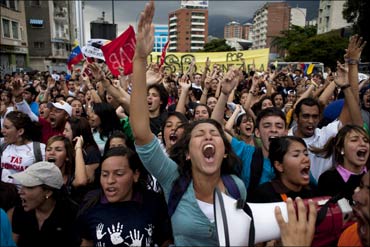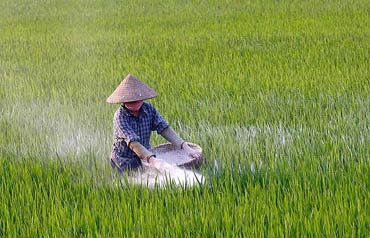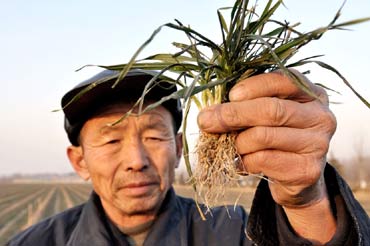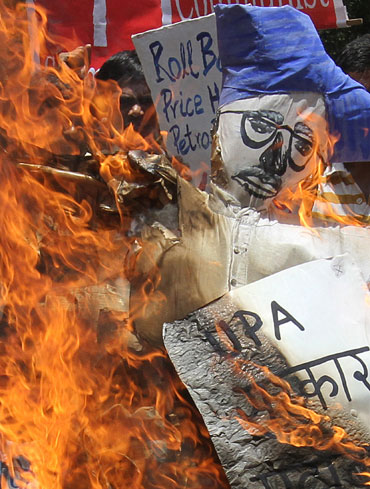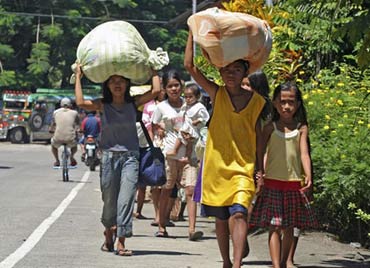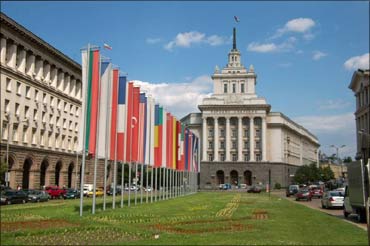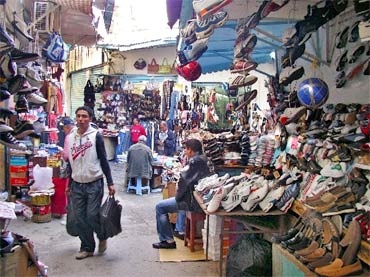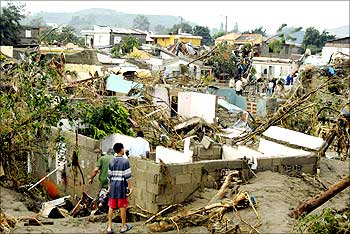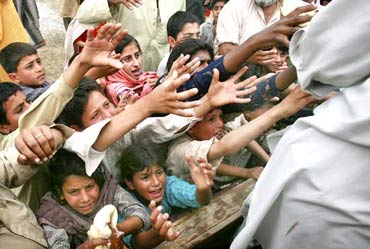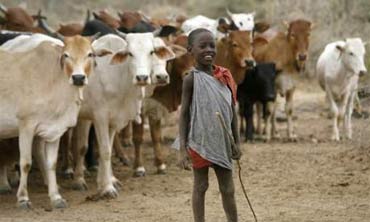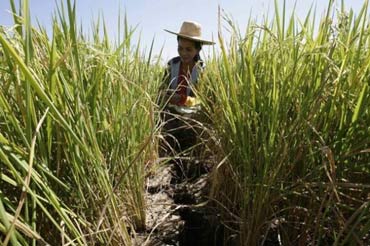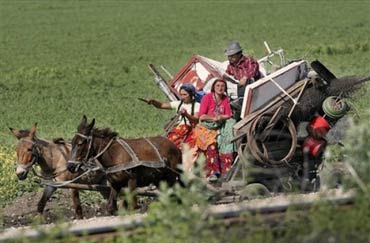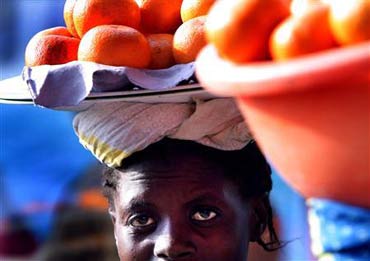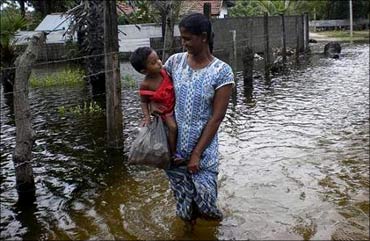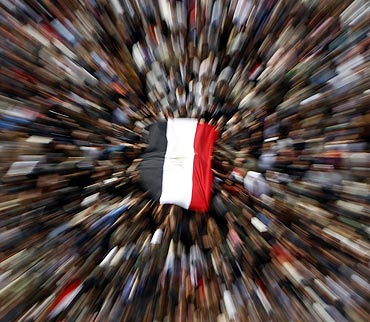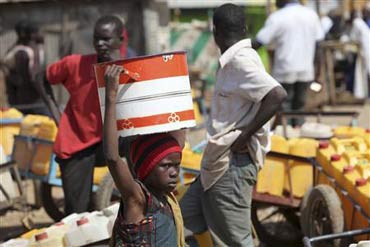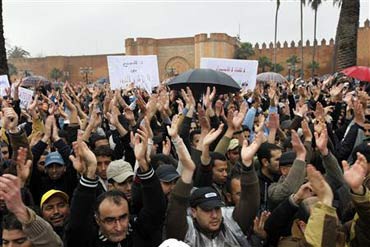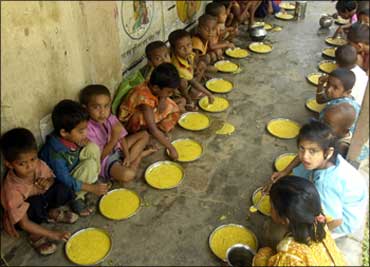 | « Back to article | Print this article |
25 nations where high food prices could crush governments
The twin scourges of inflation and corruption have been haunting the Indian government for a while now. With the Union Budget just round the corner, the UPA has a great opportunity to redresss some of these issues that bother people.
However, to be fair, rising food prices are not an Indian phenomenon alone. Fuelled by rising food and property prices, food inflation is at unsustainable levels in many countries.
The world over, food inflation is rampant. In Tunisia -- and to some extent in Egypt -- it actually led to the toppling of the government following riots over high food prices. West Asia and North Africa too have seen similar -- and huge -- protests over the hardships people are faced with due to runway inflation. Like in India, in China too food prices are going through the roof.
And experts now say that after Tunisia and Egypt, some other governments too are in danger of being taken to task by angry people who are suffering from unbearably high prices.
Nomura, a leading Japanese financial services group and investment bank with global reach, has come out with the Nomura Food Vulnerability Index. The index details the economies that are the most vulnerable to the food crisis.
Click NEXT to read on about the nations where governments could be toppled if food inflation continues to rise . . .
Source: Nomura
25 nations where high food prices could crush governments
The Nomura Food Vulnerability Index also speaks about which countries' governments, apart from Tunisia and Egypt, could be toppled in a food crisis.
Nomura describes a food crisis as a prolonged spell of price rise, and calculates the economies that have the most to lose by a formula that has:
- Nominal GDP per capita in dollars at market exchange rates.
- The share of food in total household consumption.
- Net food exports as a percentage of GDP.
For a sample of 80 of the world's largest economies that Nomura undertook for the report, it normalised each of the above three data series by subtracting the mean and dividing the resulting value by the standard deviation.
From the normalised series, NVFI is calculated for each country as a weighted composite index:
NFVI = 100 - 0.25*(GDP per capita) - 0.25*(food/household consumption) + 0.5*(net food exports/GDP)
The NFVI scores rank the 80 countries from the most vulnerable (highest NFVI score) to the least vulnerable (lowest NFVI score) to a food price surge.
So here are 25 countries are the most vulnerable to a food crisis and whose governments could get crushed by food price inflation.
Click NEXT to read on . . .
25 nations where high food prices could crush governments
25. Venezuela
Venezuela is the 25th most vulnerable economy in a food crisis, says Nomura.
GDP per capita: $11,246
Food as a percentage of total household consumption: 32.6%
Net food exports (as percentage of GDP): -1.0%
Note: Nomura's index is calculated using these three variables. The higher per capita GDP, the better the number, as consumers have more to spend. The lower percentage of income spent on food, the better. And the more food exported, the better, as it means there is excess for domestic consumption.
Click NEXT to read on . . .
25 nations where high food prices could crush governments
24. Vietnam
GDP per capita: $1,051
Food as a percentage of total household consumption: 50.7%
Net food exports (as percentage of GDP): 0.8%
Click NEXT to read on . . .
25 nations where high food prices could crush governments
23. Latvia
GDP per capita: $14,908
Food as a percentage of total household consumption: 34.3%
Net food exports (as percentage of GDP): -1.1%
Click NEXT to read on . . .
25 nations where high food prices could crush governments
22. China
GDP per capita: $3,267
Food as a percentage of total household consumption: 39.8%
Net food exports (as percentage of GDP): -0.3%
Click NEXT to read on . . .
25 nations where high food prices could crush governments
21. India
Inflation has been a major thorn in the UPA government's side, even as it struggles to steer the country towards a high growth trajectory, but most of all higher prices of edibles ranging from egg to milk and fruits to onions ruined even the most unrefined palate.
Fuelled by high wages, rising property and food prices, food inflation in India is at an almost unsustainable 11 per cent level.
The severity of inflation could be gauged only when the prices of onion, which shot up to Rs 70-80 a kg, is juxtaposed with the average daily wages of India's nearly 300 million informal sector workers -- Rs 100.
GDP per capita: $1,017
Food as a percentage of total household consumption: 49.5%
Net food exports (as percentage of GDP): 0.3%
Click NEXT to read on . . .
25 nations where high food prices could crush governments
20. Ukraine
GDP per capita: $3,899
Food as a percentage of total household consumption: 61.0%
Net food exports (as percentage of GDP): 0.9%
Click NEXT to read on . . .
25 nations where high food prices could crush governments
19. Bulgaria
GDP per capita: $6,546
Food as a percentage of total household consumption: 49.5%
Net food exports (as percentage of GDP): -0.1%
Click NEXT to read on . . .
25 nations where high food prices could crush governments
18. Tunisia
GDP per capita: $3,903
Food as a percentage of total household consumption: 36.0%
Net food exports (as percentage of GDP): -1.1%
Note: The government in Tunisia has already been toppled following violent food riots.
Click NEXT to read on . . .
25 nations where high food prices could crush governments
17. Dominican Republic
GDP per capita: $4,576
Food as a percentage of total household consumption: 38.3%
Net food exports (as percentage of GDP): -1.1%
Click NEXT to read on . . .
25 nations where high food prices could crush governments
16. Libya
GDP per capita: $14,802
Food as a percentage of total household consumption: 37.2%
Net food exports (as percentage of GDP): -1.7%
Click NEXT to read on . . .
25 nations where high food prices could crush governments
15. Pakistan
GDP per capita: $991
Food as a percentage of total household consumption: 47.6%
Net food exports (as percentage of GDP): -0.4%
Click NEXT to read on . . .
25 nations where high food prices could crush governments
14. Kenya
GDP per capita: $783
Food as a percentage of total household consumption: 45.8%
Net food exports (as percentage of GDP): -0.8%
Click NEXT to read on . . .
25 nations where high food prices could crush governments
13. The Philippines
GDP per capita: $1,847
Food as a percentage of total household consumption: 45.6%
Net food exports (as percentage of GDP): -1.0%
Click NEXT to read on . . .
25 nations where high food prices could crush governments
12. Romania
GDP per capita: $9,300
Food as a percentage of total household consumption: 49.4%
Net food exports (as percentage of GDP): -1.1%
Click NEXT to read on . . .
25 nations where high food prices could crush governments
11. Angola
GDP per capita: $4,714
Food as a percentage of total household consumption: 46.1%
Net food exports (as percentage of GDP): -1.4%
Click NEXT to read on . . .
25 nations where high food prices could crush governments
10. Azerbaijan
GDP per capita: $5,315
Food as a percentage of total household consumption: 60.2%
Net food exports (as percentage of GDP): -0.6%
Click NEXT to read on . . .
25 nations where high food prices could crush governments
9. Hong Kong
This may come as a shocker to many, for Hong Kong is one of the richest, best administered states in the world. And yet the food crisis here could take toll on the government, infers the Nomura report.
GDP per capita: $30,863
Food as a percentage of total household consumption: 25.8%
Net food exports (as percentage of GDP): -4.4%
Click NEXT to read on . . .
25 nations where high food prices could crush governments
8. Sudan
GDP per capita: $1,353
Food as a percentage of total household consumption: 52.9%
Net food exports (as percentage of GDP): -1.3%
Click NEXT to read on . . .
25 nations where high food prices could crush governments
7. Sri Lanka
GDP per capita: $2,013
Food as a percentage of total household consumption: 39.6%
Net food exports (as percentage of GDP): -2.7%
Click NEXT to read on . . .
25 nations where high food prices could crush governments
6. Egypt
GDP per capita: $1,991
Food as a percentage of total household consumption: 48.1%
Net food exports (as percentage of GDP): -2.1%
When the report was readied, there was no popular uprising in Egypt against President Hosni Mubarak. But the food crisis was all too visible during the Egyptian riots as well. The food revolution in Tunisia and Egypt exposed the weak grasp of autocratic rulers in poverty-stricken nations that import grain.
Click NEXT to read on . . .
25 nations where high food prices could crush governments
5. Lebanon
GDP per capita: $6,978
Food as a percentage of total household consumption: 34.0%
Net food exports (as percentage of GDP): -3.9%
Click NEXT to read on . . .
25 nations where high food prices could crush governments
4. Nigeria
GDP per capita: $1,370
Food as a percentage of total household consumption: 73.0%
Net food exports (as percentage of GDP): -0.9%
Click NEXT to read on . . .
25 nations where high food prices could crush governments
3. Algeria
GDP per capita: $4,845
Food as a percentage of total household consumption: 53.0%
Net food exports (as percentage of GDP): -2.8%
Click NEXT to read on . . .
25 nations where high food prices could crush governments
2. Morocco
GDP per capita: $2,769
Food as a percentage of total household consumption: 63.0%
Net food exports (as percentage of GDP): -2.1%
Click NEXT to read on . . .
25 nations where high food prices could crush governments
1. Bangladesh
Bangladesh is most vulnerable economy to a food crisis, and thus by corollary its government is the most likely to be crushed if prices do not stabilise. Something that the Prime Minister Sheikh Hasina-led government may well pay heed to if it wants to continue in power.
GDP per capita: $497
Food as a percentage of total household consumption: 53.8%
Net food exports (as percentage of GDP): -3.3%



